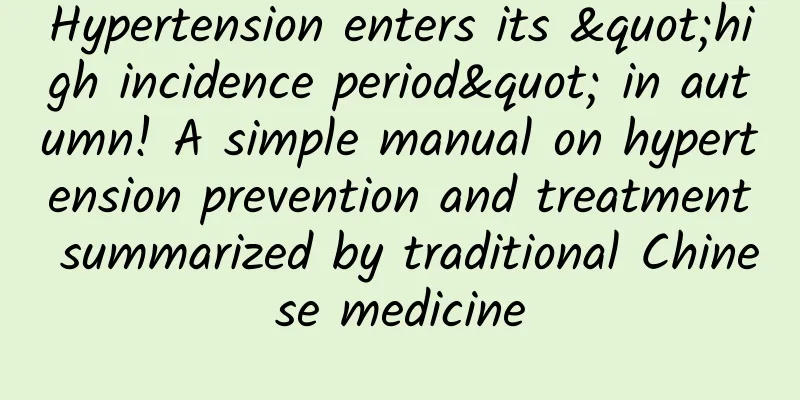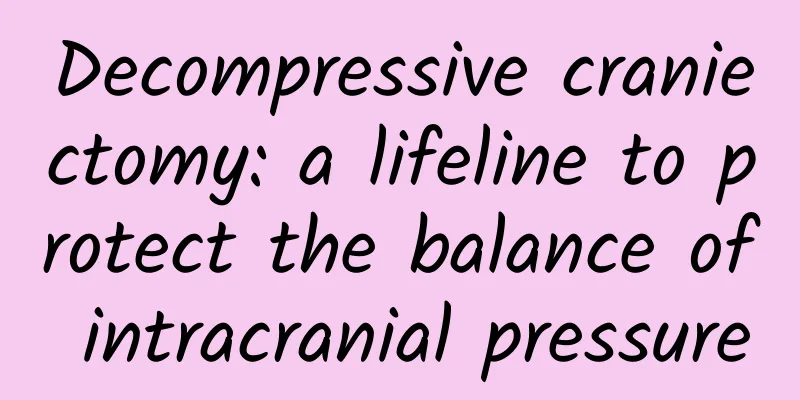Source: China Traditional Chinese Medicine News
Reporter: Wang Di
Editor's note. Hypertension is the most common cardiovascular disease in the world and in my country, and is known as the "invisible killer". How to prevent and treat hypertension? Jin Xianglan, chief physician of the Second Department of Encephalopathy, Beijing University of Chinese Medicine Oriental Hospital, and Li Yan, deputy chief physician of the Department of Cardiology, Beijing University of Chinese Medicine Oriental Hospital, have summarized a manual for the prevention and treatment of hypertension. Come and learn about it~ Jin Xianglan introduced that the ideal blood pressure value is: systolic pressure (high pressure) <120mmHg, diastolic pressure (low pressure) <80mmHg. If the blood pressure is between 120/80~139/89mmHg, it is in the state of "higher than normal blood pressure, but not yet considered a disease". If the following two situations occur, it means that you have high blood pressure. Measurement in the clinic: Without taking antihypertensive drugs, if the blood pressure is measured ≥140/90mmHg three times on different days, high blood pressure can be diagnosed.
Measure at home: Blood pressure ≥135/85 mmHg for 3 times is considered hypertension.
Jin Xianglan said that the clinical manifestations of patients with hypertension vary. Common symptoms include dizziness, headache, tinnitus, insomnia, fatigue, and sometimes even chest tightness and palpitations. Pregnant hypertension may cause proteinuria and edema. Menopausal hypertension may cause symptoms such as weakness in the waist and knees, and edema in the limbs.
Some patients with hypertension have no typical symptoms, and even have no discomfort when their blood pressure is very high. This group of people should be more careful and vigilant. Having no symptoms does not mean that elevated blood pressure will not damage the body's organs. Long-term hypertension may cause life-threatening complications such as coronary heart disease, myocardial infarction, heart failure, and kidney damage and fundus damage.
Li Yan said that hypertension is a preventable and controllable disease, and accurate blood pressure measurement is a prerequisite for controlling blood pressure. He suggested that everyone should measure blood pressure whenever they have the opportunity in their daily lives, especially the following 11 groups of people, who are recommended to measure regularly: people with a family history of cardiovascular and cerebrovascular diseases such as hypertension and coronary heart disease; people who have long-term excessive salt intake, heavy taste, often eat takeout or socialize outside; long-term smokers; overweight and obese people; alcoholics; people who lack exercise and work at a desk for a long time; people with mental tension and high pressure; people who often stay up late and suffer from insomnia; people who often feel dizzy, have headaches, have neck discomfort, and have memory loss; people who have physical examinations or occasionally measure high blood pressure; people over 30 years old.
Jin Xianglan introduced that the medical community has not yet found a drug that can cure hypertension. For hypertension, the treatment goal is to control blood pressure levels and blood pressure variability. Patients diagnosed with hypertension need to take medication for a long time, rather than arbitrarily stopping medication based on their own feelings. Taking antihypertensive drugs to stabilize blood pressure can effectively reduce the occurrence of adverse events such as myocardial infarction and stroke.
Li Yan introduced that many people believe that "all medicines are poisonous" and that antihypertensive drugs can damage the liver and kidneys, so they "stay away" from antihypertensive drugs. Little do they know that the damage to the human body caused by high blood pressure is far greater than the potential side effects of antihypertensive drugs. Some people stop taking drugs or reduce the dosage as soon as their blood pressure drops, and take more drugs when their blood pressure is high, causing blood pressure to fluctuate, which is more harmful to the body. He suggested that the selection of antihypertensive drugs should follow the following principles: low-dose medication, priority selection of long-acting drugs, combination medication, and individualized treatment.
Jin Xianglan introduced that on the basis of drug treatment, patients can also cooperate with acupoint massage, Chinese medicine guidance techniques, Chinese medicine tea substitutes and other Chinese medicine special therapies for assistance.
Head massage: Massage the Baihui point (located at the intersection of the midline of the top of the head and the line connecting the two ear tips), the Sanjiao meridian, and the gallbladder meridian. Separate the palms of your hands and place them on the hairline above the ears, with the index finger in front and the thumb behind. Push from the hairline above the ears to the top of the head. When the palms of your hands meet on the top of the head, lift the hair up. Repeat with a little force 10 times.
Foot massage: Massage Yongquan acupoint (located at the bottom of the foot, approximately at the intersection of the front 1/3 and the back 2/3 of the line connecting the 2nd and 3rd metatarsal sutures and the heel), Taixi acupoint (located on the inside of the foot, in the depression between the back of the medial malleolus and the heel bone tendon), and Kunlun acupoint (located behind the lateral malleolus, in the depression between the tip of the lateral malleolus and the Achilles tendon). Sit on the bed and use the thumbs of both hands to push from Yongquan acupoint to the heel. Stop the operation when a local heat sensation appears. Do this 1 to 2 times a day. In addition, pinching the large tendon of the back heel and the Taixi and Kunlun acupoints on both sides of it can help lower blood pressure.
Hand massage: Massage Laogong acupoint (in the palm, between the 2nd and 3rd metacarpal bones, on the 3rd metacarpal bone, at the tip of the middle finger when making a fist), Hegu acupoint (in the back of the hand, between the 1st and 2nd metacarpal bones, at the midpoint of the radial side of the 2nd metacarpal bone), Shenmen acupoint (located on the wrist, at the ulnar end of the palmar transverse line of the wrist, in the radial depression of the ulnar flexor carpi tendon), Shaochong acupoint (at the radial side of the last segment of the little finger, 0.1 inch from the nail corner), Guanchong acupoint (at the ulnar end of the ring finger, 0.1 inch from the nail corner). Press or knead each acupoint 50 to 100 times with moderate force.
Long-term adherence to traditional Chinese medicine guiding exercises such as Tai Chi, Ba Duan Jin, Yi Jin Jing, etc. can unblock the Qi, regulate the mind, and play a therapeutic role in hypertension. It is recommended to practice once a day, each time for 30 to 60 minutes.
Hawthorn tea: Use 1 to 2 fresh hawthorns or 6g of dried hawthorn slices to make tea and drink it several times a day.
Lotus seed heart tea: Use 12g lotus seed heart, brew with boiling water, several times a day.
Li Yan introduced that hypertension is a lifestyle disease. To prevent and treat hypertension, we should pay attention to the following points in our daily life and adhere to them.
Reasonable diet, limit sodium High sodium can increase blood pressure, so limit sodium intake. The diet should be as light as possible, reduce the intake of foods rich in fat and sugar, limit the use of cooking oil, eat more vegetables and fruits, and eat less fast food and takeout.
Control your weight. Obesity can easily lead to high blood pressure, so you should try to keep your weight within a reasonable range.
Studies on quitting smoking and limiting alcohol consumption have found that quitting smoking and limiting alcohol consumption can help lower blood pressure.
Appropriate exercise: Patients with hypertension should develop good exercise habits, but strenuous exercise is not suitable. The form of exercise can be flexibly selected according to their own preferences.
Insufficient sleep and staying up late can easily cause endocrine disorders and is an important cause of high blood pressure. It is recommended to go to bed before 11 o'clock every night.
Control your emotions, learn to relieve mental stress and maintain a balanced mentality. |










